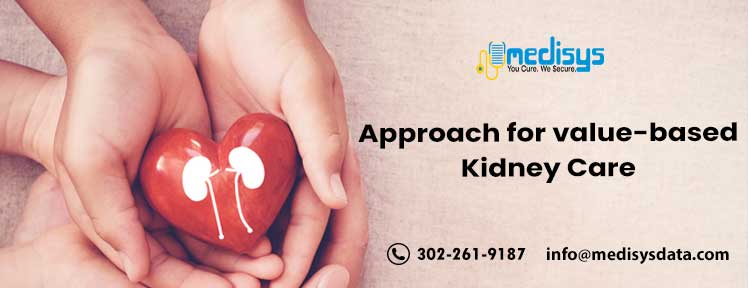The purpose behind value-based kidney care is to enhance the quality of life for thousands of Americans while reducing the cost of care simultaneously by improving outcomes related to kidney disease. In the US nearly 37 million Americans are facing Chronic Kidney Disease (CKD) and most of the people are not diagnosed yet. Even a simple urine test can provide an early warning if CKD becomes symptomatic. Chronic kidney disease cost $81.8 billion in 2018 for the Medicare population alone. It accounted for around seven percent of paid Medicare claims which lead to the need for value-based kidney care.
ESRD and CDK were previously not covered under Medicare Advantage which results in a higher cost of treatment for Medicare beneficiaries with Chronic Kidney Disease and ESRD. For example- The Cost for treatment for Medicare beneficiaries with Chronic Kidney Disease incurred USD 84 billion for treatment of patients and ESRD an additional USD 36 billion, according to CDC in 2017. Hence Medicare advantage remodified its plan offerings in 2021 which includes people under the MA plans for ESRD coverage, minimizing the expenditure factor that affected receiving proper kidney care.
The federal government is working hard to transform the traditional approach to kidney care treatments and encouraging providers for a more holistic value-based care delivery. These efforts include the mandatory ESRD Treatment Choices (ETC) Model, as well as a voluntary value-based care model – Kidney Care Choices (KCC).
In this blog, we will investigate the value-based kidney care model
The Kidney Care Choices program (KCC)
CMS developed the next value-based care iteration Kidney Care Choices (KCC) based on various past learnings from CEC and other specialties’ value-based models. Launching in 2021, KCC is CMS’ newest value-based kidney care model. The KCC program helps in incentivizing the nephrologists, facilities for dialysis, and practices for ESRD healthcare.
KCC offers two voluntary sub-models:
- Kidney Care First (KCF), a nephrologist-only model.
- Comprehensive Kidney Care Contracting (CKCC), an ACO-like model.
Let’s understand each model in detail.
Kidney Care First (KCF), a nephrologist-only model
Kidney Care First, offers financial incentives to participants to accomplish the following goals:
- Manage care for patients with CKD and end-stage renal disease.
- Delay the onset of dialysis for patients; and
- Incentivize kidney transplantation.
This program is optional and avail only to nephrology practices and their nephrologists. Participating practices are held responsible for beneficiaries’ kidney care from late-stage CKD or ESRD through dialysis, kidney transplantation, and post-transplant care.
Comprehensive Kidney Care Contracting (CKCC), an ACO-like model
The Comprehensive Kidney Care Contracting (CKCC) Options are a set of three voluntary payment options under the Kidney Care Choices (KCC) Model designed to reduce Medicare expenditures while preserving or enhancing the quality of care furnished to beneficiaries with late-stage chronic kidney disease (CKD) and end-stage renal disease (ESRD). CKCC expands beyond ESRD including CKD patients.
KCC is mainly focused on the nephrologist that drives attribution into the model and this program is responsible for addressing various misalignment in kidney care reimbursement with the inclusion of encouraging transplant, rewarding investment in the interdisciplinary care team, greater emphasis on CKD management, and leveling payments across dialysis modalities.
Technology Usage for Serving as a Valuable Access to Care Delivery
COVID-19 has accelerated the usage of technology in the healthcare sector many folds. Adoption of technology brings digital innovation and stratification into the business organization. Managed Care Organizations (MCOs) and Accountable Care Organizations (ACOs) were dependent on providing value-based care services to chronic ailments during the period of Covid-19. Hence, senior members of plans and chronically ill have experienced better health outcomes at lower costs. The inclusion of ESRD and Chronic Kidney Care into Medicare Advantage plans has improved patient care and given better offerings that help to prevent and treat ESRD.
With the help of technology fighting against the year-long pandemic has been possible due to the increased digital integration in the #revenuecyclemanagement #healthcare #medicalbillnhealthcare systems. Digital solutions are playing important role in healthcare organizations and primary care providers for enhancing their chronic care management.
In conclusion, Medicare Advantage members and care providers are looking for enhanced value-based Kidney Care systems to experience better health outcomes. To know more about how you can prepare effectively. Get in touch with us.












